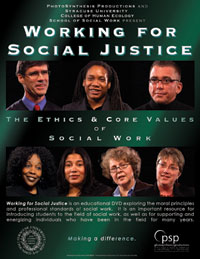Media/Arts
By Robert DeLauro, MSW, ACSW A production of PhotoSynthesis Productions and Syracuse University, College of Human Ecology, School of Social Work One of my most vivid memories from the 2008 presidential campaign involves Sarah Palin’s speech at the Republican National Convention. Scornfully, she insulted Barack Obama by demeaning his experience as a community organizer in Chicago. She said that “being the governor of Alaska was somewhat like being a community organizer … only with responsibility!” Take that bleeding hearts! With that speech, social work—and specifically community organizing—made it on to the national stage but, not surprisingly, with derision and disrespect attached. Throughout the campaign, Obama’s stint as a community organizer was a favorite target of the conservative pundits. They ridiculed the notion of a community organizer and questioned its value, while freely admitting that they did not have a clue about what a community organizer does. Working for Social Justice is a recruiting DVD, produced for the Syracuse University School of Social Work. It makes the case for social work as a unique profession that involves a variety of practice methods, including working with communities and community organizations. The planned collective action of a community organizer. as well as the individual, family. and group work of other social work professionals. result in countless and wide-ranging improvements in people’s lives. The DVD allows a group of social workers from varied backgrounds and different professional settings to express their appreciation, delight, and pride in their profession. There is very little sugar coating of the work. They acknowledge the lack of financial support, the complex settings, the thorny decisions, and the challenging clients they face on a daily basis. Coupled with this is the lack of support and basic understanding for what they do—not just by the Sarah Palins of the world, but often by their own friends and family members. This DVD provides a good introduction to most of the key tenets of the profession. For example, there are discussions of social work’s commitment to serving society’s most vulnerable populations and its outreach into many socially and economically deprived settings. Associating social workers with the underprivileged and disenfranchised, whom the average citizen usually avoids and misunderstands, may account for some of the hostility and mistrust directed toward social workers in general and community organizers in particular. Another important social work principle that receives attention in this DVD is the belief in the dignity and worth of each person. One social worker from a prison setting describes a central task of her work as “accepting people as more than their crime.” Throughout the DVD, there is a return to the theme of accepting and meeting the client wherever he or she is, not just physically but, more importantly, where he or she is emotionally. The DVD segments describing this challenge were the most poignant and inspiring. There are also some excellent discourses on the need to fine-tune and constantly improve listening skills. The ability to successfully listen is too often minimized and not recognized for its true value. A significant portion of the DVD’s narration emphasizes establishing trust with clients. The message is made crystal clear for the potential social worker watching the DVD: It is through well-established and supportive relationships that truly effective social work is done. To become a social worker, as the title of the DVD states, is to embrace certain values. Foremost is the belief that service to people in need is constructive and indispensable, not frivolous and misguided. Public perceptions of social workers as simple-minded, ineffective, busy bodies will always be a test for the profession. This DVD neatly outlines the numerous ways that social workers effectively create change and make a difference—for individuals, families, groups, communities, and indeed, a nation. — Robert DeLauro, MSW, ACSW, is an organization development consultant at Saint Vincent Catholic Medical Centers in New York City. He is also president of the New Jersey chapter of the Martin Scorsese Fan Club. |

 A Film Review of Working for Social Justice: The Ethics & Core Values of Social Work
A Film Review of Working for Social Justice: The Ethics & Core Values of Social Work